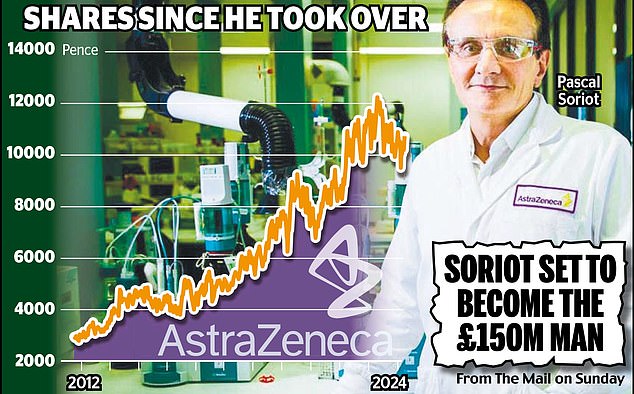<!–
<!–
<!– <!–
<!–
<!–
<!–
Astrazeneca’s boss is “very underpaid” and deserves a raise, according to one of his main investors.
Speaking ahead of the pharmaceutical company’s annual meeting tomorrow, one of the top 20 shareholders backed the appointment of Pascal Soriot as the FTSE 100’s first £150m chief executive.
AstraZeneca is asking its shareholders to approve a performance-based deal that could net it up to £18.7 million this year.
That would take his total earnings to £153m since taking charge in 2012.
Investor groups have called the package “excessive” and urged shareholders to vote against it.

Pay package: Astrazeneca asks its shareholders to approve performance-based deal that could net Pascal Soriot (pictured) up to £18.7m this year
The looming row was highlighted by the Mail on Sunday last weekend.
But in a big boost for Soriot ahead of the vote, Florida-based GQG Partners said the French-Australian executive has earned the right to a decent pay rise thanks to his turnaround efforts at AstraZeneca.
Soriot, 64, has been widely praised for reviving the fortunes of one of Britain’s biggest pharmaceutical companies and providing millions of people with a life-saving Covid-19 vaccine. He also fought off an unwanted takeover bid from US rival Pfizer.
Rajiv Jain, chief investment officer at GQG, told the Financial Times: ‘There is a compensation issue at AstraZeneca.
The CEO is grossly underpaid, given AstraZeneca’s impressive turnaround since he joined more than a decade ago.
Norges Bank Investment Management, which is a top 10 shareholder, has also signaled it will vote to approve Soriot’s salary.
This contrasts with two influential shareholder advisory groups, Glass Lewis and ISS, which last week urged investors to vote against the “excessive” remuneration plan at the annual meeting.
Under the proposal, Soriot could earn a bonus of up to 300 per cent of his base salary of almost £1.5m, plus performance-related stock awards worth up to 850 per cent of base salary.
This is an increase from the previous salary agreement, which allowed for a 250 percent bonus and awards worth 650 percent of his base salary.
AstraZeneca has argued that the increase is “necessary to increase competitiveness” of the company against its rivals in the United States and Europe.
Emma Walmsley, chief executive of British rival GSK, received £12.7m last year, compared to Soriot’s £16.9m. Albert Bourla, director of Pfizer, took home £17 million.
One of the world’s highest earners in the pharmaceutical sector is David Ricks, head of Eli Lilly, who was paid £21 million in 2023.
Top City business figures, including Julia Hoggett, head of the London Stock Exchange, are pushing for higher pay for executives.
He called for a “constructive discussion” on executive pay, saying Britain needed to attract the best talent.

